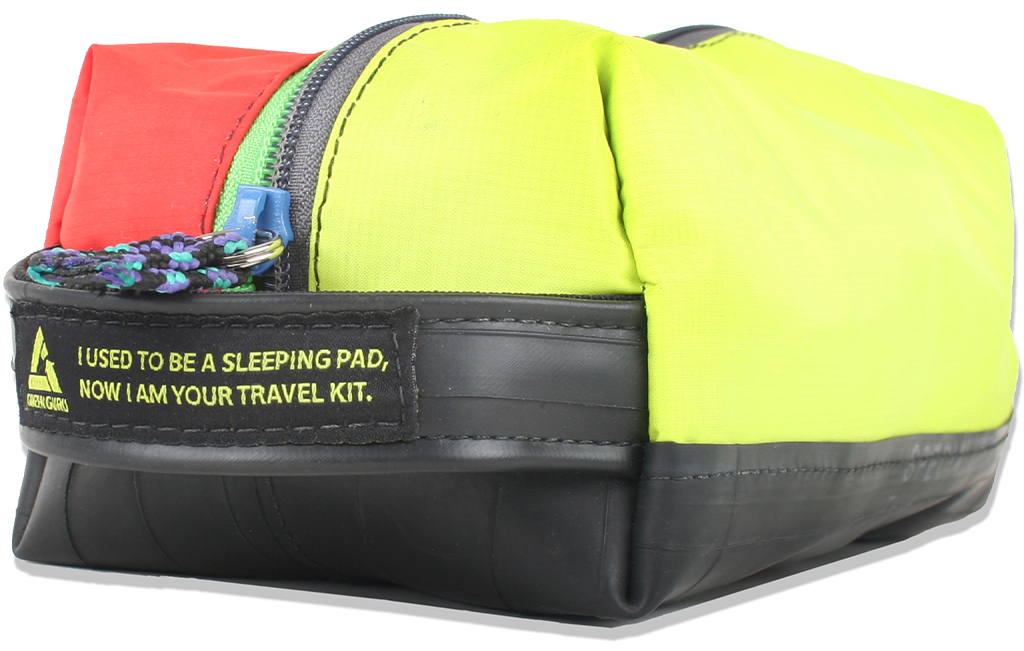If one person’s trash is another person’s treasure, then Davidson Lewis is a gold miner. He and his team at Colorado-based company Green Guru sift through the outdoor industry’s waste stream—which is more like a raging river—hunting for durable, high-quality materials that can be upcycled into everything from hard-wearing wallets to flashy, one-of-a-kind bike panniers.
Lewis’ first job was at a bike shop, “and your first job at a bike shop is changing flat tires all day long.” So Lewis got a Ph.D. in fixing flats—but became increasingly “concerned about how many tubes get thrown away.”
And those piles of rubber tires stuck with him. After graduating from Virginia Tech with a degree in industrial design, Lewis launched Green Guru in 2005, intent on turning bike-shop trash into practical products for outdoor enthusiasts. It’s a practice known as upcycling, which is often confused with recycling. Lewis explains it as “taking something that has no value and turning it into something of higher value.” Recycling, on the other hand, he says, “essentially takes something and downcycles it.”
For Green Guru, giving bike tubes a second life was just the start. “Soon thereafter, we adopted climbing rope and wetsuits as other gear waste,” he says. “And then we started taking other salvage fabrics like tents and awnings—basically any durable material—and building it into the Green Guru product line.” Today, the line includes backpacks, waist packs, panniers, various bike bags, bottle holders and its latest: the Travel Kit, in collaboration with REI Co-op. The versatile, 12-inch pouch keeps small personal items like toiletries or electronics organized—and mountains of outdoor-gear waste out of the landfill.

The Green Guru Travel Kit is made from repurposed bike tubes, sleeping pads and climbing rope.
The raw materials of the Travel Kit—bike tubes, climbing rope and sleeping pads—are all ideal candidates for upcycling. As Lewis realized during his time in the bike shop, popped tubes get chucked by the bucketload. Though many cyclists opt to patch tubes until they look like scarecrow overalls, eventually, punctures near the valve, overlapping patches or full-on blowouts render repairs ineffective. Similarly, climbers inspect ropes for damage and replace them regularly. And inflatable sleeping pads—which REI’s sustainability team identified as another ideal product for upcycling—inevitably pop or leak.
To Green Guru, these materials are only “waste” if you plan on using them for their original purpose. But Lewis saw so many other creative uses. So, he organized a collection of them at REI stores and bike shops and from individuals across the nation.
Each Travel Kit (exclusive to REI) uses a third of a bike tube for the grippy bottom and handle, which keeps wet counters from making a mess of your toiletries and protects electronics from the elements. Four inches of rope sheath ruggedize the zipper pulls. While the zippers aren’t upcycled, they’re salvaged from local suppliers (hence the two-tone styling). Lastly, the colorful sleeping pad patchwork on the top of the Travel Kit makes the durable pouch (10 by 4.5 by 3.5 inches) bright, playful and impossible to miss. All told, the co-op and Green Guru’s first batch of 3,000 Travel Kits will divert 990 bike tubes, 425 sleeping bags and 12,000 inches of rope from landfills.
“We’re talking about durable materials and gear that were intended for a very long life,” Lewis says. Now that long life includes a second act as Green Guru gear.
Want to get involved?
REI members and customers have been donating bike tubes to Green Guru for the past decade. If you’d like to contribute old gear to the brand’s upcycling efforts, get in touch here. Green Guru is currently requesting bike tubes, climbing ropes and wetsuits. Or, if you have a flat tire, bring your bike into your nearest REI bike shop (call ahead; shop times and availability vary) and we’ll happily get you riding in no time and send your tube along to Green Guru.
For more stories of brands doing good work, visit our Good Gear landing page.
